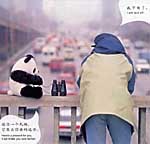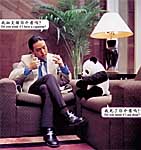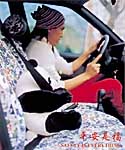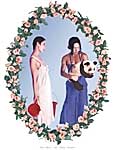|
Zhao Bandi is a soft-spoken, 34-year old graduate of the Central Academy of
Fine Arts, whose work has been shown in renowned galleries as far afield as
New York, Rotterdam, London and Sydney. The Beijing-born and bred artist is
also a celebrity in the capital, recently rising to fame in the unlikely
field of public service advertising.

Zhao's latest works are a series of photographs of himself and a toy panda
bear, engaged in a cartoon speech-bubble dialogue about issues of concern
to ordinary urban-dwellers-air pollution, violence, drug abuse and
unemployment. The pictures were displayed at the prestigious Venice
Biennale art show this year, among thousands of works from around the
world including more than 50 pieces by 20 Mainland Chinese artists. Jaded critics
arched their eyebrows at Zhao's photographs, and praised their "deadpan
black humor" and "ironic wit."
But accolades from foreign art pundits don't explain Zhao's fame at home.
He is recognized in Beijing because the same works that were catching the
art world's attention in Venice were simultaneously being displayed on 300
lightboxes at different locations in Beijing's subway system, and on
smaller posters inside the trains themselves.
The Beijing "exhibition" was not organized through an art gallery, but by
the artist himself after extensive negotiations with the Beijing subway
authorities. The lightboxes were paid for with sponsorship from Kodak, and
a printing company that displayed their logo on the photographs.
The works stayed up in the subway for the month of May per contract, and
many remain in place as the subway waits for a new paying client to fill
the advertising space. Viewed by millions of commuters, Zhao and his panda
have been extensively covered in the local press and featured on several
television stations, including the central government-run China Central
Television.
Zhao's official reception hasn't always been positive. He has been accused
by the Beijing Youth Daily of plagiarizing the dialogue for one of the
photographs in which Zhao asks the panda "Do you mind if I smoke?"
"Do you mind if I am extinct?" the panda replies. The Communist Youth Organization journal cited an American anti-smoking
campaign from the early 1990s that shows a man asking a female companion
the same question. She replies: "Do you mind if I die?" Communist Youth
Organization journals are not known for their appreciation of cross-cultural satire.

Zhao has also encountered problems due to his personal appearance. Although
he dresses smartly and does not look remotely like a hippie, one television
interview with him was rejected as unsuitable by the censors because of his
long hair.
Nonetheless, the naturally non-conformist Zhao is destined for further fame
in the southern commercial center of Shenzhen, where he recently set up his
posters on walls and pedestrian bridges. The photographs are being
displayed as part of an exhibition, mostly of sculptures, entitled Balanced
Existence: A Project for the Future of a Biological City that runs until
the end of the year 2000.
Despite the exhibition's name hinting at art with a direct connection to
Shenzhen, Zhao is the only artist whose works are displayed outside of the
gallery where they are visible to pedestrians and people passing by in cars.

Big Brother Billboards
To understand why Zhao's works are causing such a fuss, it is useful to
consider the average public messages bombarding citizens every day.
1. STRENUOUSLY CARRY OUT THE FOUR DO'S CAMPAIGN!
2. BRING PROSPERITY TO THE MOTHERLAND THROUGH SCIENCE AND TECHNOLOGY!
3. HOLD HIGH THE BANNER OF DENG XIAOPING THOUGHT!
4. BE A CIVILIZED CITY DWELLER!
These slogans are displayed on billboards across the nation, in stark red
characters painted on whitewash, or printed across a background picture of
flowers or of Tian'anmen Gate. Although the slogans appear to mean nothing
at all, they are in fact trying to convey pragmatic messages that would, if
phrased in understandable terms, appeal to most citizens' common sense.
In plain language, these slogans mean:
1. Respect yourself. Behave well. Be alert. Be independent.
2. Get educated!
3. Get rich without harming the peasants and the workers.
4. Be nice to other people.
The copy-writing comrades at the Propaganda Bureau have not noticed that
things have moved on since 1951 when everybody in the whole country knew
the exact meaning of the "Three Anti's."
Ask a random ayi what the "three anti's" were and she will probably say:
"Anti-corruption! Anti-waste! Anti-bureaucracy!"
Ask her what the "Four Do's" are, and she will probably say: "Eh! Maybe
something to do with clean toilets?"
While the marketing people at Marlboro, Motorola, and even the Miyun Peanut
Factory know exactly how to get their message across to trans-millennial
consumers, the Propaganda Bureau still insists on addressing the People
(i.e. consumers) in drab Partyspeak. So even when they have something
useful to say, like "Don't drink a bottle of Erguotou and then go for a
drive" or "Don't throw your trash in the street," their message occupies
the average Zhou's attention for approximately 0.1 nanoseconds.
Enter Zhao Bandi, handsome, well-traveled artist with ponytail, and Mi,
fluffy toy panda bear (Made in China).
Marching straight out of the art gallery into Beijing's subway system, Zhao
and Mi have appealed to a broad range of people from old ladies to young
hipsters with a mix of humor and concern for ordinary lives that is rarely
given public expression in the PRC.
"Modern society lacks a sense of humor. Everything is too pedantic. Watch
TV anytime: there are a few public service advertisements that say a funny
thing or two, but they always end up saying: 'Don't do this, don't do that?
"I want my public service advertisements to be human and to appeal to human
feelings."
The Artist as a Young Advertising Man
Zhao began making a name for himself in 1993 when his oil paintings were
displayed in a China Avant-Garde exhibition that toured Europe. Coveted
participation in the Venice Biennale this year seems like a crowning
achievement for a young artist, but Zhao has increasingly found the air in
art galleries to be a little too stuffy. "In Venice I felt constricted," he
says, "there was no connection between the art and society." Having works
displayed on underground trains ensures a connection to society, but is it
art?
"I don't really care what you call it?In my 'classical period' I painted
and made sculptures and installations. Now I want to see if I can interact
more directly with society in a beneficial way."
Zhao says he hopes to popularize public service advertisements, and to
transform his work from its marginal, 'alternative' (linglei) status to
mainstream acceptance where it can influence a society that is suffering
from a lack of spiritual civilization.
He chose a panda bear as his comrade in arms in the struggle for public
service because it is a rare and precious animal and a readily identifiable
symbol of China. Despite this, Zhao says, no one has ever given the panda a
lovable public face: "Think of the giant panda statue on the traffic circle near the Asian Games
Village," he says, referring to a three-meter-tall fiber-glass Disney
mutant built to entertain (or perhaps threaten) athletes who came to
Beijing in 1992 to participate in the games. "That panda is a monster!"
Dialogue With Whom?
Although Zhao's latest works and his reluctance to talk about them as
anything other than "public welfare advertisements" may seem a little like
toadying to the powers-that-be, his statements about the Asian Games panda
may be a clue to some of the more cutting commentary implicit in the
photographs.
Like government propaganda, the Asian Games panda is large, ominous,
shoddily-made and imposed on the public by a faceless authority. By
contrast, Zhao's panda is cute, humorous and created by an identifiable
individual. Zhao's protests notwithstanding, his 'public welfare
advertisements' do not offer glib answers to the difficult problems they
are addressing, and they at least entertain the masses on their way to
work. One of the photos depicts Zhao standing on a freeway pedestrian
bridge with his back to the camera, saying "I am laid off." The
panda-holding the neckstrap of a pair of binoculars-says, "Here's a present
for you, it will make you look farther."
If you live in Beijing, you know that on most days binoculars will not help
you see any farther, because the yellow-gray substance that passes as air
is not penetrable beyond 50 meters. In the photograph, Zhao is staring into
a particularly soupy-looking patch of atmosphere above the traffic-clogged
Third Ring Road. Which is a nice metaphor for the prospects of many people
who have actually been laid off in the past few years.
In another photograph from the series, Zhao wears a rubber Halloween mask,
and asks the panda "Is there anything more terrible than me?" "It's DRUG!" answers Mi the panda.
How menacing does Zhao actually look wearing that silly mask? This little
cartoon skit doesn't really seem intended to discourage anyone from
"inhaling." There is another more subtle dialogue going on behind the words
Zhao exchanges with little Mi. A look at some of Zhao's previous work
reveals an abiding concern for the language of advertising and propaganda,
and the power it has over people's dreams.
A 1998 photographic work depicts a large Hong Kong-style skyscraper. A
glowing neon sign at the top of the building exhorts the viewer with a
Cultural Revolution slogan written in English: "Never forget class
struggle!"
In 1996 Zhao produced the first of a series of 'calendar' photograph with
alternative rock singer Zhang Qianqian. Simply titled Zhao Bandi and Zhang
Qianqian, the photograph depicts Zhao steering a small boat through heavy
green water lilies on a lake in Baiyangdian, Hebei province, the site of a
Communist guerrilla victory over Japanese forces. Zhao wears a dressing
gown; Zhang wears a feminine summer dress, short top and embraces a toy
panda bear. Both have the kind of lyrical facial expressions that models
assume when they pose for shmaltzy photo album covers and karaoke videos.
Both works depict a shiny, dreamy surface-the skyscraper and the
luxurious-looking honeymoon scene-with a more sinister past hinted at by a
Cultural Revolution slogan that most people would rather forget, and a
place that reminds Chinese people of the bitter war against the invading
Japanese Imperial Army.
Nuances such as these distinguish Zhao's works from advertising and its
twin sister propaganda because no matter how much you speculate about what
they mean, their message remains ambiguous. Breaking out of the art gallery
and into public spaces does however send the citizens of Beijing one
message that is perfectly clear: the days of government monopoly on public
expression are long gone. Gone too, if Zhao has his way, is the gilded cage
that contemporary Chinese art has been suffocating in since the first
unofficial art emerged in the late 1970s, to the horror of the Ministry of
Culture and the delight of fashionable collectors of art from countries
where they don't write with the Roman alphabet. |





